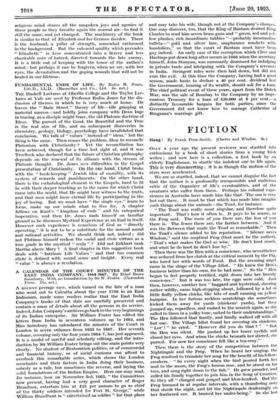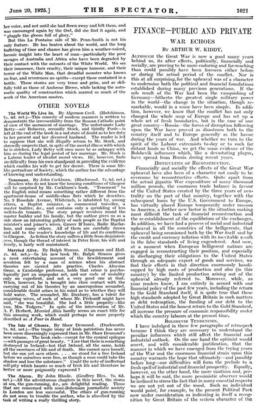FICTION
ONLY a year ago the present reviewer was startled into enthusiasm by a book of short stories from a young Irish writer ; and now here is a collection, a first book by an elderly Englishman, to startle the indolent one to life again. This is very disconcerting ; it is as though the motion of the stars were accelerated.
We are so startled, indeed, that we cannot disguise the fact that the author is a profoundly irresponsible and malicious critic of the Organizer of life's eventualities, and of the creatures who suffer from them. Perhaps his colonial expe- riences in Australia have made him like that. The sun is very hot out there. It must be that which has made him imagine such things about the animals—the Toad, for instance.
• " The Toad was really most singular, and therefore quite important. That's how it often is. It pays to be scarce, as the Frog said. The more of you there are, the less of you there is. The fewer there are, the farther between. And it was the Between that made the Toad so remarkable." Then the Toad's silence added 'to his reputation. " Silence saves Wisdom," said the sceptical Frog (that must be the author). :- That's what makes the Owl so wise. He don't hoot much, and what he do hoot he don't lose by."
• Then there was the Hen with a conscience, who nevertheless was seduced from her clutch at the critical moment by the Pig, who lured her with words of Food. But the accusing angel came in the shape of the Village Idiot. " He knew the Hen's business better than his own, for lie had none." So the " Hen began to feel properly terrified, right down into her broody. conscience."' But it was too late, the eggs were cold. Just then, however, another hen " haggard and hysterical, steering rather wildly, came high-stepping about, followed by a lot of little fluffy yellow chicks, like bits of muff running on yellow, hairpins. In her furious reckless scratchings she sometimes kicked them away for yards (chickens' yards), but they jumped up, regardless, and rushed to the scratch again, as she called to them in a yolky tone, suited to their understandings." The Hen followed that family, and finally walked off with all but one. The Village Idiot found her covering six chickens.
Lor' ! " he cried. " However did you do that ? " ".But the Hen was silent. She pushed up her lower eyelids and closed her eyes. And when the chicks beneath her stirred, she purred. For now her conscience felt like a tea-cosy."
- Then there is the story of the competition between the Nightingale and the Frog. When lie heard tier singing, the Frog resolved to translate her song for the benefit of his fellow- -croakers. " So every night when the bird poured forth her soul to the moon, the Frog's bosom rose, and he stood on his toes, and sang right down to the fish." He grew prouder, and 'called his family together to join him in the Song of Creation. So they all " clanged and gouged and klon-konked. But the 'Frog boomed in at regular intervals, with a thundering note that slick& the night, and hit'the Nightingale. deafeningly on -her feathered ear. It bruised her under-being.!' So she lost
her voice, and not until she had flown away and left them, and was encouraged again by the Owl, did she find it again, and " gluggle the gloom full of glory."
But this La Fontaine side of Mr. Penn-Smith is not his only feature. He has beaten about the world, and the long buffeting of time and chance has given him a weather-voiced, laconic insight into the heart of man—particularly the poor savages of Australia and Africa who have been degraded by their contact with the outcasts of the White World. We see their innocence, their cruelty, their unique humour, and their terror of the White Man, that dreadful monster who knows no fear, and reverences no spirits—except those contained in a bottle. These stories are very tense and grim, and as skil- fully told as those of Ambrose Bierce, while lacking the auto- matic quality of construction which marred so much of the work of the American master.











































 Previous page
Previous page